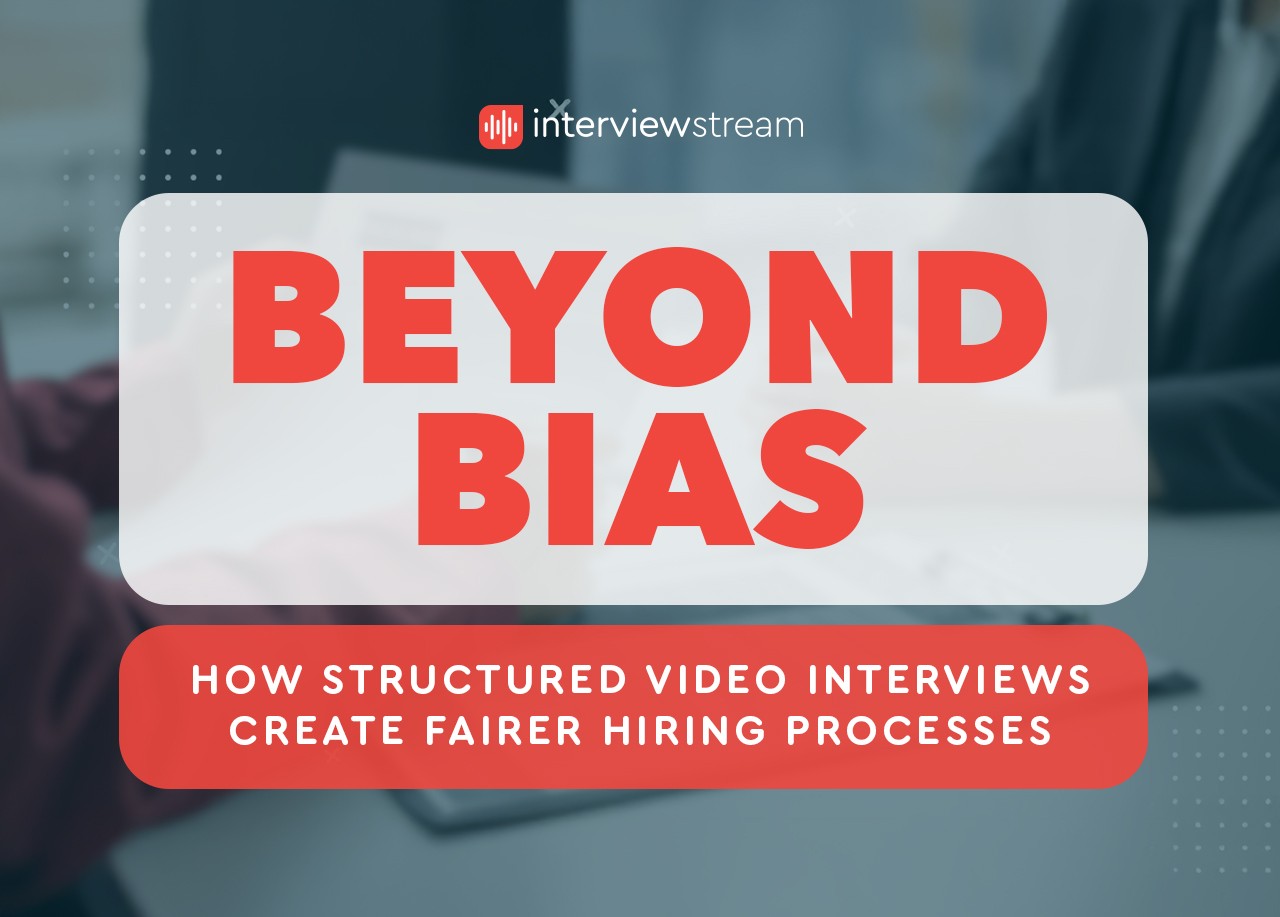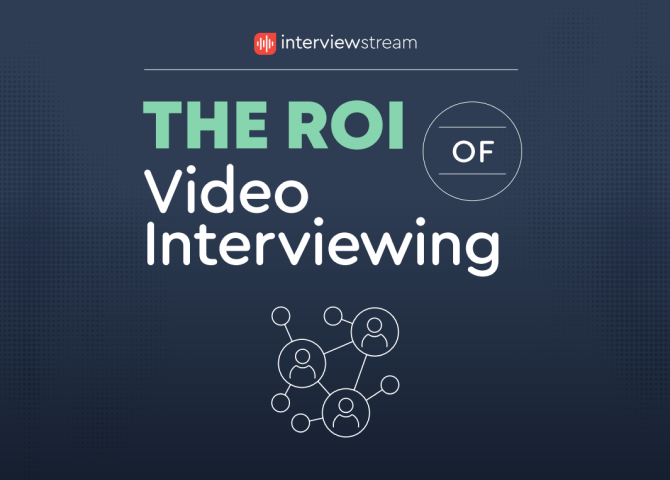Beyond Bias: How Structured Video Interviews Create Fairer Hiring Processes

The rundown
- Why Unstructured Interviews Fail: Small inconsistencies in questions, scoring, and evaluation create systemic bias that drives bad hires, increases turnover, and blocks top talent—costing your organization in ways you can measure.
- How Structure Eliminates Bias: Standardized questions, pre-defined scoring rubrics, and job-relevant scenarios create consistency that removes subjective impressions from the process while improving predictive validity.
- The Video + AI Advantage: On-demand video interviews level the playing field for all candidates, while AI-powered summaries and collaborative review tools make fair evaluation scalable without removing human judgment from final decisions.
- Building a Fair System: Fair hiring isn’t a one-time fix—it requires trained teams, strong review panels, continuous monitoring of fairness, and a commitment to iterating based on data.
Table of contents
- The Hidden Cost of “Going with Your Gut”
- The Persistent Problem of Bias in Hiring
- What Makes an Interview “Structured”?
- How Video Interviews Amplify Fairness
- The Role of AI in Fair Evaluation
- Building a Culture of Fair Hiring (Not Just a Checklist)
- How interviewstream Supports Equitable Hiring
- The Bottom Line
- About interviewstream
The Hidden Cost of “Going with Your Gut”
Bias in hiring isn’t always intentional, but it’s almost always present.
It happens when one candidate gets asked about their weekend plans while another faces a grilling about gap years. It surfaces when an interviewer unconsciously gravitates toward someone who went to the same college. It emerges in the subtle weight given to “culture fit” over actual qualifications.
These small inconsistencies don’t feel like bias in the moment. But aggregate them across hundreds of hiring decisions, and they become systemic barriers that keep top talent out and drive up turnover costs.
For organizations serious about fairness, transparency, and performance, this isn’t just an ethics issue—it’s a business problem as well.
The solution? Structured video interviews—a method that blends consistency and accessibility, with modern tools. When organizations pair a structured approach with the right tools, including video interview software and AI-powered summaries, they shift from gut-based choices to evidence-based decisions.
Interested in our HR newsletter? Sign up below!
Sign up for our newsletter – we send out a newsletter email two to four times a year which includes HR trends, industry-relevant knowledge, and the latest interviewing tips for recruiters and candidates.
The Persistent Problem of Bias in Hiring
Unstructured interviews leave too much to chance. Research consistently shows that when interview questions vary, when scoring is vague, and when interviewers rely on “how the candidate made me feel,” bias creeps in. That can mean:
- Affinity Bias: Favoring candidates who remind us of ourselves.
- Confirmation Bias: Cherry-picking evidence that supports snap judgments.
- Appearance Bias: Making assumptions based on presentation rather than qualifications.
The consequences extend far beyond individual unfairness. Poor hiring decisions lead to increased turnover, legal exposure, and missed opportunities to bring in high performers who could transform your team.
The research is clear: structured interview formats significantly outperform unstructured ones in predicting job performance. According to the U.S. Office of Personnel Management (OPM), structured interviews “increase interviewers’ agreement on their overall evaluations by limiting the amount of discretion an interviewer is allowed.” One review by the Journal of Occupational and Organizational Psychology found that structured interviews produce stronger predictive validity than unstructured ones.
When you aim for fair hiring, the first step is a fair process—and structure is key to that aim.
What Makes an Interview “Structured”?
What separates a structured interview from the usual “let’s see where the conversation goes” approach? A structured interview process means:
- Identical Questions: Every candidate answers the same questions in the same order.
- Pre-defined Scoring Criteria: Rubrics ensure each answer is evaluated on the same basis.
- Job-Relevant Questions: Focus on behavioral scenarios, situational judgment, and role-specific knowledge instead of generic prompts.
- Interviewer Training and Calibration: Regular reviews ensure consistency across your hiring team.
Why does this matter? Because structure reduces variability, increases reliability, and improves fairness. From a fairness standpoint, the equal treatment of candidates reduces opportunities for subjective impressions and biases to influence outcomes. (See McGill University Department of Psychology’s article for more on structured vs unstructured interviews.)
For example, imagine a customer service role where every candidate is asked:
- Describe a time a customer was upset and how you resolved the situation.
- What would you do if a customer’s request conflicted with policy?
And each answer is scored on three criteria: empathy, clarity of communication, and resolution effectiveness on a 1-5 scale.
This is a simple example of a structured hiring process in practice. And it’s the foundation for everything that follows.
How Video Interviews Amplify Fairness
Structured video interviews elevate fairness and accessibility even further, especially when using on demand video interview formats.
Here’s how:
- On-Demand Flexibility: Candidates answer standardized questions on their own schedule, eliminating logistical barriers and timezone conflicts.
- Multi-Reviewer Capability: Recorded responses allow multiple stakeholders to evaluate answers independently, reducing single-rater bias.
- Accessibility: Remote candidates, caregivers, and those requiring accommodations can participate without disadvantage.
- Built-In Audit Trails: Documentation supports compliance efforts and enables data-driven fairness analysis.
Studies have found that applicants perceive asynchronous or one-way video interviews (AVIs) as a fair method of selection. These benefits make structured video interviewing a powerful tool in your fair hiring toolkit.
The Role of AI in Fair Evaluation
Technology kicks in when you scale. The best modern setups don’t just rely on video—they add AI recruiting tools like interview-summary generators, analytics dashboards, and automation of scheduling to make structured interviews easier to manage at scale.
Here’s how those tools contribute to fairness:
- AI interview summaries condense the recorded responses into key themes—helping teams compare candidates consistently.
- Collaborative review features allow multiple hiring team members to assess the same candidate independently, compare notes, and reach a consensus based on shared evidence rather than first impressions. This collective scoring process reduces the influence of individual bias and increases confidence in final decisions.
- Integrated feedback workflows make it easier for recruiters, HR leaders, and hiring managers to work from the same structured criteria, ensuring fairness isn’t just a function of software—it’s a team practice.
The critical distinction: AI assists human decision-making. It doesn’t replace it.
You still need experienced hiring managers who understand your culture, recognize potential, and make the final call. AI simply removes friction from the process and surfaces patterns you might otherwise miss.
Building a Culture of Fair Hiring (Not Just a Checklist)
Technology and structure matter, but without culture, they won’t stick. Here are some practical steps to build a fairer overarching hiring system:
- Train your interviewers on bias awareness, structured evaluation, and how to use your video and AI tools correctly.
- Use Analytics to Monitor Fairness Metrics: Are certain demographic groups consistently rated lower? Is there a skew in who advances?
- Diversify Your Panels: Even though the interview itself is standardised, having multiple reviewers from different backgrounds adds perspective and guards against a single-rater bias.
- Communicate Your Process to Candidates: Explain that you use structured video interviews and standard scoring.
- Iterate and Improve: Use your data. Review where disparities occur. Update questions, rubrics, or training accordingly.
Fair hiring becomes a dynamic system, not a one-time checklist.
How interviewstream Supports Equitable Hiring
At interviewstream, we’re helping organizations put structure and fairness into their hiring process with purpose-built tools. Here’s how:
- Structured Video Interviews: Easily design consistent question sets and scoring rubrics for your roles.
- On-Demand Video Interview Capability: Give every candidate identical prompts, equal time, and a level playing field.
- AI-Generated Interview Summaries: Save time and ensure consistent review across all responses.
- Collaborative Evaluation Features: Multiple reviewers and transparent scoring to look out for potential bias.
Our platform is built on the principle: structure + technology + human judgement = fair, efficient, and effective hiring. Whether you’re hiring teachers, healthcare workers, or corporate roles, these tools help your teams make better decisions while staying true to the value of fairness in hiring.
The Bottom Line
Bias in hiring may be subtle, but its effects aren’t.
Inconsistent interviews lead to bad hires. Bad hires drive up turnover. Turnover erodes team performance and organizational culture. And through it all, qualified candidates who don’t “fit the pattern” never get the opportunity to prove themselves.
A fair hiring process starts with structure. Video interview software scales that structure while making access and evaluation more equitable. AI tools streamline the workflow—but only when paired with human judgment and oversight.
When you bring these elements together, fair hiring stops being an aspirational value and becomes a measurable outcome.
——
Ready to make your hiring process more consistent, fairer, and smarter? See how structured video interviews and AI-powered summaries can shift your evaluations from biased to evidence-based.
Book a demo with interviewstream and discover what fair, consistent, and smarter hiring looks like in practice.
Want to learn more about video interviewing?
Chat with a client success expert today and learn how to leverage remote interviewing solutions to simplify and personalize your hiring practices.
About interviewstream
interviewstream is an industry leading recruiting software company that helps you reach your top candidates more effectively. Our customers have completed over 3 million interviews using interview builder, interview on demand, interview scheduler, interview connect – and we’d love to help you as well. Talk to an expert today to learn how to get started.
Want a PDF version of this eBook?
Fill out the form below to get a PDF version of this eBook.
The interviewstream platform
Speak to an expert today to learn how our remote interviewing solutions make hiring more effective.
About interviewstream
We exists to help recruiters and hiring teams ask the right questions every time, screen candidates faster, make scheduling easier and reach candidates everywhere. Using our remote interviewing platform, your team will have a complete view of the candidate in one location while also leveraging one of the leading platforms for online interviewing.
Table of contents
- The Hidden Cost of “Going with Your Gut”
- The Persistent Problem of Bias in Hiring
- What Makes an Interview “Structured”?
- How Video Interviews Amplify Fairness
- The Role of AI in Fair Evaluation
- Building a Culture of Fair Hiring (Not Just a Checklist)
- How interviewstream Supports Equitable Hiring
- The Bottom Line
- About interviewstream



